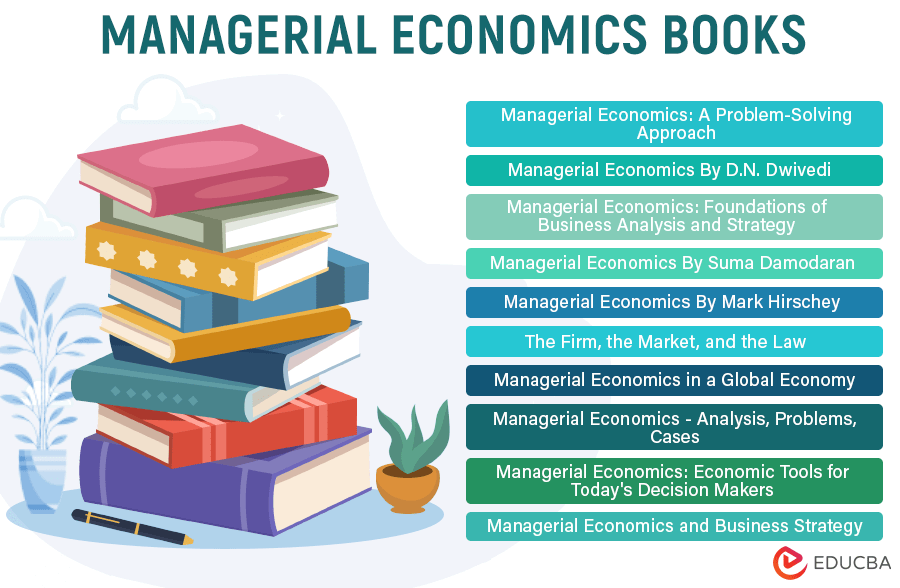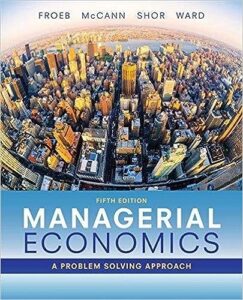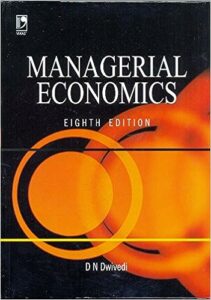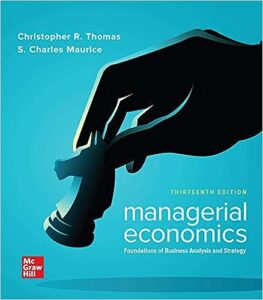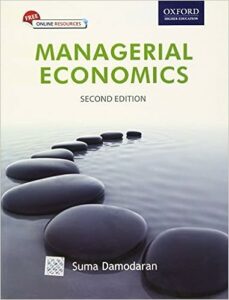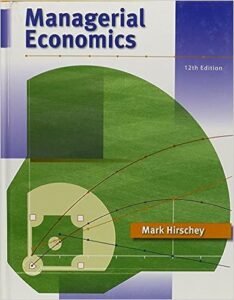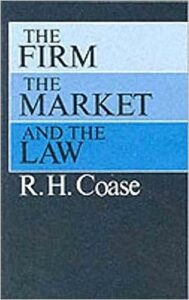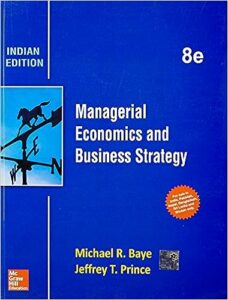Best Books on Managerial Economics
Managerial economics books explain how managerial economics combines economics and business concepts and employs tools to improve decision-making. It uses the principles of microeconomics and macroeconomics, providing managers and leaders with the required data, including demand projections, pricing, capital and profit management, production, and cost analysis. This lets business executives make the best decisions at the firm level.
The list of books that we have compiled below will give the readers a clear understanding of managerial economics. These are the must-read top 10 managerial economics books. We walk you through each book review and provide you with its key points.
| # | Books | Author | Published | Rating |
| 1 | Managerial Economics: A Problem-Solving Approach | Brian T. McCann, Mike Shor, Michael R. Ward, Luke M. Froeb | 2017 | Amazon: 4.3 Goodreads: 3.72 |
| 2 | Managerial Economics | D.N. Dwivedi | 2015 | Amazon: 4.4
Goodreads: 4.38 |
| 3 | Managerial Economics: Foundations of Business Analysis and Strategy | Christopher R. Thomas, S. Charles Maurice | 2019 | Amazon: 4.1
Goodreads: 3.63 |
| 4 | Managerial Economics | Suma Damodaran | 2010 | Amazon: 4
Goodreads: 4.33 |
| 5 | Managerial Economics | Mark Hirschey | 2008 | Amazon: 4
Goodreads: 3.59 |
| 6 | The Firm, the Market, and the Law | R. H. Coase | 1990 | Amazon: 4.4
Goodreads: 4.20 |
| 7 | Managerial Economics in a Global Economy | Dominick Salvatore | 2014 | Amazon: 4.5
Goodreads: 3.91 |
| 8 | Managerial Economics – Analysis, Problems, Cases | Lila J. Truett, Dale B. Truett | 2006 | Amazon: 4.2
Goodreads: 3.62 |
| 9 | Managerial Economics: Economic Tools for Today’s Decision Makers | Paul Keat and Philip K. Young | 2005 | Amazon: 4.0
Goodreads: 3.67 |
| 10 | Managerial Economics and Business Strategy | R. Michael Baye | 2017 | Amazon: 4.3
Goodreads: 3.56 |
Let us now review each one of the managerial economics books to help you select the right one for your managerial economic requirement.
Book #1: Managerial Economics: A Problem-Solving Approach
Author: Brian T. McCann, Mike Shor, Michael R. Ward, and Luke M. Froeb
Buy this book here.
Review:
This book serves as a textbook in many institutions. It provides a comprehensive introduction to the field of managerial economics. The book covers essential topics, including demand analysis, production, and cost analysis. It also talks about pricing strategies, market structure, and competition. The author uses various real-world examples to illustrate the practical use of economic concepts.
Key Points:
- The book provides a hands-on understanding of how to use economic analysis in decision-making.
- It includes real-world examples, case studies, and practice problems to help readers understand and apply these concepts to real business problems.
- The book is well-organized and easy to read, making it accessible to students and managers with a general economics background.
- The book includes problem-solving and decision-making aspects of managerial economics and provides analytical tools and frameworks for making well-informed decisions.
Book #2: Managerial Economics
Author: D.N. Dwivedi
Buy this book here.
Review:
Managerial Economics – the eighth edition comes with the latest theories and applications. It is best suited for professionals looking to learn more in the field. The author provides a summary after each chapter-end for a quick review, which helps simplify the concepts further.
Key Points:
- The reader gets to the practicality of managerial economics with answers to questions like why the demand curve slopes downward right, the theory of determining the interest rate, and the current trade policy of India.
- The author also discusses global influencers like the role of the IMF, monetary policies, and the Indian CSR scenario.
- The reader gets ideas on what to expect while expanding production.
Book #3: Managerial Economics: Foundations of Business Analysis and Strategy
Author: Christopher R. Thomas and S. Charles Maurice
Buy this book here.
Review:
The author discusses economic principles and methods in managerial economics while managing a business or organization. It helps managers make decisions by providing a framework for analyzing business problems and strategies. The author also discusses how managerial economics helps managers make better decisions that will ultimately lead to business success.
Key Points:
- The author mainly focuses on managerial economics as per microeconomic theory to understand and solve business problems.
- The reader learns about business problems like pricing strategies, product design, and production methods.
- The author further reflects on quantitative methods, such as statistical analysis and mathematical modeling.
- The book helps to analyze data and make predictions about future market conditions.
Book #4: Managerial Economics
Author: Suma Damodaran
Buy this book here.
Review:
The textbook covers the concepts of managerial economics in totality with economic and mathematical concepts and programming. The author constantly cites the concepts with examples and delves into case studies to provide a better understanding of the concepts. It goes on to discuss the challenges that businesses face in the new market. The book is perfect for management students.
Key Points:
- The edition contains illustrations and cases throughout for simplified understanding.
- The reader understands business economic concepts like perfect competition, oligopoly, monopoly, special pricing, long-term investments, etc.
- The author discusses monetary and fiscal policies in consideration of macroeconomics.
Book #5: Managerial Economics
Authors: Mark Hirschey
Buy this book here.
Review:
The author takes the common-sense approach to solve the economic concepts to manage business better. Aspiring managers make decisions on producing lucrative products, their costs, hiring the right people, hiring policy, and employing the most favorable style of organization. The author explores a range of business decisions, revealing how various factors interact and functions collaborate.
Key Points:
- Readers learn through the valuation model how a manager combines different aspects of a business, like finance, accounting, production and personnel, and different functions of production.
- The reader learns about basic economic relations and marginal analysis and their play in economic optimization.
- The book is written simplistically with examples and numerical problems revealing the role of a manager in practical situations.
Book #6: The Firm, the Market, and the Law
Author: R. H. Coase
Buy this book here.
Review:
Ronald H. Coase, the winner of the Nobel Prize in 1991, presents a different perspective on microeconomics or price theory through the study of firms, industries, and markets. He examines the foundation of economic theories to bridge the gap between theory and practice.
Key Points:
- The content provides insight into economics through the study of institutional practices.
- The author presents arguments that simplify Coase’s methodological position.
- The reader learns complicated theories as the content is captivating and simplified for beginners and experts.
Book #7: Managerial Economics in a Global Economy
Author: Dominick Salvatore
Buy this book here.
Review:
This book presents clear and concise explanations of concepts. It also uses real-world examples to illustrate these global-context economic concepts. This book is ideal for students who have little prior knowledge of economics.
Key Points:
- The book covers the basic concepts and tools of microeconomics and their application to solving various business problems such as pricing, production, and marketing, focussing on how globalization affects these issues.
- The book provides a framework for analyzing business problems and strategies using microeconomic theory and quantitative methods.
- It reflects the impact of globalization and international trade on business decision-making and how to apply economic theory to analyze and solve problems in this context.
Book #8: Managerial Economics – Analysis, Problems, Cases
Authors: Lila J. Truett, Dale B. Truett
Buy this book here.
Review:
The authors show how to make correct business decisions using economic analyses. The authors have presented economic theory with case studies to show the reality of business situations and how to tackle them. It helps readers become better at problem-solving, a skill necessary for success at the managerial level.
Key Points:
- The reader gets exposed to various types of problems a business may incur.
- Readers learn to make elasticity calculations and have minimum costs and maximum profits through examples of real-world firms.
- The book addresses global case scenarios and the use of managerial economics to arrive at a favorable outcome.
Book #9: Managerial Economics: Economic Tools for Today’s Decision Makers
Author: Paul Keat and Philip K. Young
Buy this book here.
Review:
The book showcases clear and concise explanations of key concepts and its use of real-world examples to illustrate the application of these concepts to business decision-making. The book is well-organized and easy to follow, making it suitable for students new to economics.
Key Points:
- The book covers the basic concepts and tools of microeconomics and their application to various business problems.
- The book offers a structure for examining business issues and strategies using microeconomic theory and quantitative tools like statistics and mathematical models.
- The book includes real-world examples, case studies, and international examples to demonstrate how these concepts apply in practice and help students.
Book #10: Managerial Economics and Business Strategy
Author: R. Michael Baye
Buy this book here.
Review:
R. Michael Baye covers the managerial economics fundamentals and the market forces influencing business decisions. The book covers economic dynamics, firms, industries, and the marketplace. It covers the nitty gritty of all economic factors and is an appropriate textbook for college.
Key Point:
- The reader understands demand and supply and individual behavior theory.
- The reader comprehends how to manage different types of markets, including competitive, monopolistic, and competitive.
- The book covers game theory for firms, including pricing strategies, information economics, and governments in various marketplaces.
Recommended Books
We hope our list of the best 10 managerial economics books helps you find the best book. For more similar recommendations, EDUCBA suggests the following titles:
